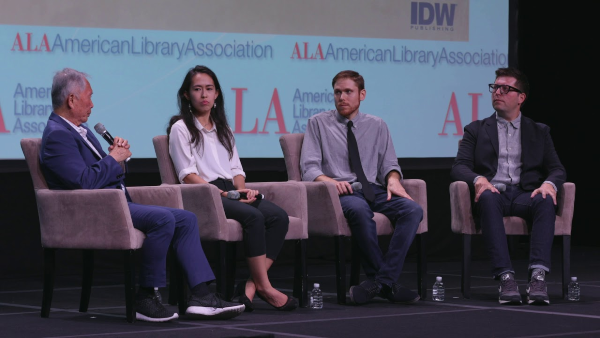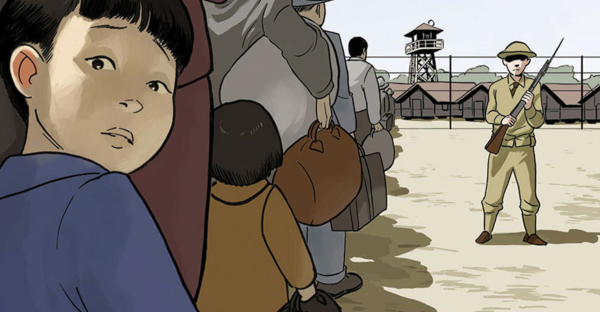George Takei on Democracy | ALA Annual 2019
Author, actor, and activist George Takei continued the American Library Association (ALA) Annual Conference’s speaker series on Monday, June 24, in Washington, DC. Takei recalled the internment of Japanese Americans during World War II, which is also the focus of his upcoming graphic memoir, They Called Us Enemy.

Author, actor, and activist George Takei continued the American Library Association (ALA) Annual Conference’s speaker series on Monday, June 24, in Washington, DC. Takei recalled the internment of Japanese Americans during World War II, which is also the focus of his upcoming graphic memoir, They Called Us Enemy.
"When I was five years old, I was categorized as an enemy and threat to the U.S. We were looked at with fear, suspicion, and outright hatred." He explained that their bank accounts and life savings were frozen. "Franklin D. Roosevelt signed an executive order to have us rounded up, without due process. The central pillar of justice dissapeared...I still remember the terror of that terrible morning. Literally at gunpoint, we were ordered out of our room."
Takei explained that he wrote the story of Japanese American internment since it is little-known, even among younger Japanese Americans. He added that the generation that experienced the internment was hurt, shamed, and disgraced by the experience, and that it's still difficult to talk about. "What would have been a grotesquely abnormal experience became normality. It became normal to bathe with my father and brother in a mass shower."

They Called Us Enemy, in Takei's words, captures the joy, discovery, surprise, and puzzlement of a child—but also his parents love for each other. He describes the book as a story of anguish, fear, horror, and resilience.
 "This is an American story. It's our history. Our history is filled with chapters like mine. I tell the story because of hope. Hope is what immigrants brought to this country....What is happening at the Southern border, and banning people [from the country] based on their faith are all parts of the same story."
"This is an American story. It's our history. Our history is filled with chapters like mine. I tell the story because of hope. Hope is what immigrants brought to this country....What is happening at the Southern border, and banning people [from the country] based on their faith are all parts of the same story."
He also shared the story of his grandparents, who turned what was considered wasteland into productive farmland. "They came with hope for their children and grandchildren." Hope, in his words, is what Takei and his family relied on during the traumatic experience of internment. He recounted feeling out of place after the war, after returning to his hometown of Los Angeles; but he still had hope.
Takei concluded by urging people to vote. "A people's democracy is dependent on people who actively engage in the process of participatory democracy." He reminded the audience that people make laws, and people can also change them. "We need to make our democracy a truer democracy." In short, by our non-participation, we allow other people to make decisions.
After a standing ovation, Takei introduced his co-authors: artist and illustrator Harmony Becker; writer and publicist Steven Scott; and Justin Eisinger, Editorial Director, Graphic Novels & Collections for IDW Publishing. It has been Takei's life mission to tell his story and with the support of his husband Brad, who was in the audience, he now has a chance to do so. Following the event, Takei signed copies of his book, which is being published in July 2019.
Photos © 2019 American Library Association

RELATED
ALREADY A SUBSCRIBER? LOG IN
We are currently offering this content for free. Sign up now to activate your personal profile, where you can save articles for future viewing









Add Comment :-
Comment Policy:
Comment should not be empty !!!